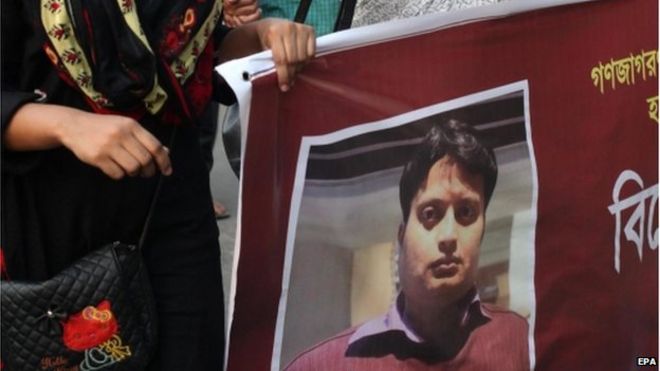
Despite officially being a secular country, more than 90% of Bangladeshi citizens are Muslim. It is perhaps that fact which explains the inaction of government officials in the wake of multiple murders of secular and atheist bloggers at the hands of Islamic extremists. In February, Bangladeshi-American blogger Dr. Avijit Roy was hacked to death during broad daylight on a Dhaka street at the hands of Islamic extremists. His wife, Rafida Bonya Ahmed, was also attacked and was critically injured, though she survived.

In March, secular blogger Washiqur Rahman was also slain by Islamic extremists. His assailants attacked him just outside his home as he was heading to work. As with the murder of Roy, Rahman’s attackers brutally killed him with knives and meat cleavers. Their attack was so barbaric…so brutal…that Rahman had to be identified by his voter identification card because his face, neck, and head had been maimed so badly.

One would think the government of Bangladesh would have stepped up efforts to protect its citizens from the threat of religious extremism. This is, after all, the job of a government-to protect its citizens. No matter how many feelings are hurt, no matter how much “offense” is taken over the criticism of religious views, no one should live under the threat of being murdered simply for possessing and sharing anti-religious views. But for all that Rahman’s attackers have been captured, the Bangladeshi government has faced strong criticism for its failure to protect secular writers in the country.
That lack of protection resulted in the death of yet another critic of religion. In May, 33-year-old Ananta Bijoy Das, a blogger at ‘Mukto Mona’ (a secular and freethinking blog founded by Avijit Roy), was killed by attackers on his way to work. As with the prior killings of secular bloggers, the terrorists killed Das in broad daylight. Though he was rushed to a hospital, Das did not survive.

On August 7, Islamic extremists took the life of a fourth secular blogger. Niloy Chakrabarti, who used the pen-name Niloy Neel, was killed in his home in Dhaka. Like the other secular bloggers, Chakrabarti’s attackers hacked him to death with machetes.

Defying all common sense, Bangladeshi officials initially responded in the absolute worst manner possible-siding with the Islamic extremists who not only believe that anti-religious sentiment is a crime, but that it ought to be punishable by death:
A spokesman for the police chief defended his boss, saying although freedom of speech was enshrined in the constitution, bloggers “should speak responsibly”.
Spokesman Nazrul Islam told AFP that freedom of religion was also protected in the constitution.
“Hurting either of these two would be labelled an infringement of the law,” he said.
Top Islamic cleric Fariduddin Masuod slammed the bloggers for creating unrest. “Unfortunately, many so-called free-thinkers are abusing their rights of freedom of speech and are thus creating anarchy,” he told AFP.
This is obscene. The Bangladeshi government is wrong to think that religion ought to be above criticism. Religious beliefs often impact the lives of people other than the individuals who hold those beliefs. Given that, they ought to be open to critique, mockery, or even denigration. By protecting religious beliefs and elevating them above criticism, the Bangladeshi government fosters an environment where extremists feel justified in punishing those who are critical of religion. It shouldn’t need to be said, but I’ll do so anyway: religious beliefs cannot be harmed. They’re ideas. They can be criticized, mocked, belittled, and disparaged and nothing will happen because they are merely ideas. In contrast, people *can* be harmed. And in fact, because the dominant religious views of Bangladesh are being treated as sacred, people *are* being harmed. People are being killed-all because the Bangladeshi government feels that ideas ought to be protected more than people. Which is an absolutely vile position that stands in direct opposition to human rights (to say nothing of the values of a so-called secular society).
In a small bit of good news, spokesmen for Bangladesh’s elite security force (RAB), said they have arrested three Islamic militants who claim to have been involved in the planning and execution of several of the attacks on secular bloggers:
Rapid Action Battalion (RAB) spokesmen said they arrested Touhidur Rahman, 58, and two other “active members” of an Islamic group called Ansarullah Bangla Team (ABT), which was banned in May over a series of killings of bloggers.
“We’ve arrested them in the capital today. We can confirm that Rahman is a Bangladesh-origin British citizen. He is the main planner of the attacks on Avijit Roy and Ananta Bijoy Das,” Major Maksudul Alam of the RAB told AFP.
“He told us that he is a British citizen,” said Mufti Mahmood, the head of the RAB’s legal and media division, adding that the three would be paraded before the press later Tuesday.
Of course this is a good thing. But the government of Bangladesh needs to do much more to ensure that secular bloggers are able to remain safe, secure, and able to express their views without the threat of murder hanging over their heads. Moreover, they need to make changes to their system of government to ensure that human rights are their primary concern, not religious sensibilities. It is all fine and good to protect religious liberty. In fact, a government ought to do so. But protecting religious liberty means enabling citizens to worship as they choose, to worship where they choose, and to worship how they choose. It does not mean ensuring that religious beliefs are kept off-limits from criticism, because as we’ve seen time and time again, when that happens, human beings suffer and die. And human beings are far more important than goddamn religious beliefs.

